Best AI tools for< Run Ui >
20 - AI tool Sites

Dora
Dora is a no-code 3D animated website design platform that allows users to create stunning 3D and animated visuals without writing a single line of code. With Dora, designers, freelancers, and creative professionals can focus on what they do best: designing. The platform is tailored for professionals who prioritize design aesthetics without wanting to dive deep into the backend. Dora offers a variety of features, including a drag-and-connect constraint layout system, advanced animation capabilities, and pixel-perfect usability. With Dora, users can create responsive 3D and animated websites that translate seamlessly across devices.

Dora
Dora is an AI-powered platform that enables users to create 3D animated websites without the need for coding. It caters to designers, freelancers, and creative professionals who seek to design visually captivating websites effortlessly. With Dora, users can craft mesmerizing 3D and animated visuals that are responsive and seamlessly translate across devices. The platform is designed for professionals who prioritize design aesthetics and offers a no-code experience for those transitioning from other design tools. Dora leverages advanced AI algorithms to generate, customize, and deploy stunning landing pages, revolutionizing the web design process.
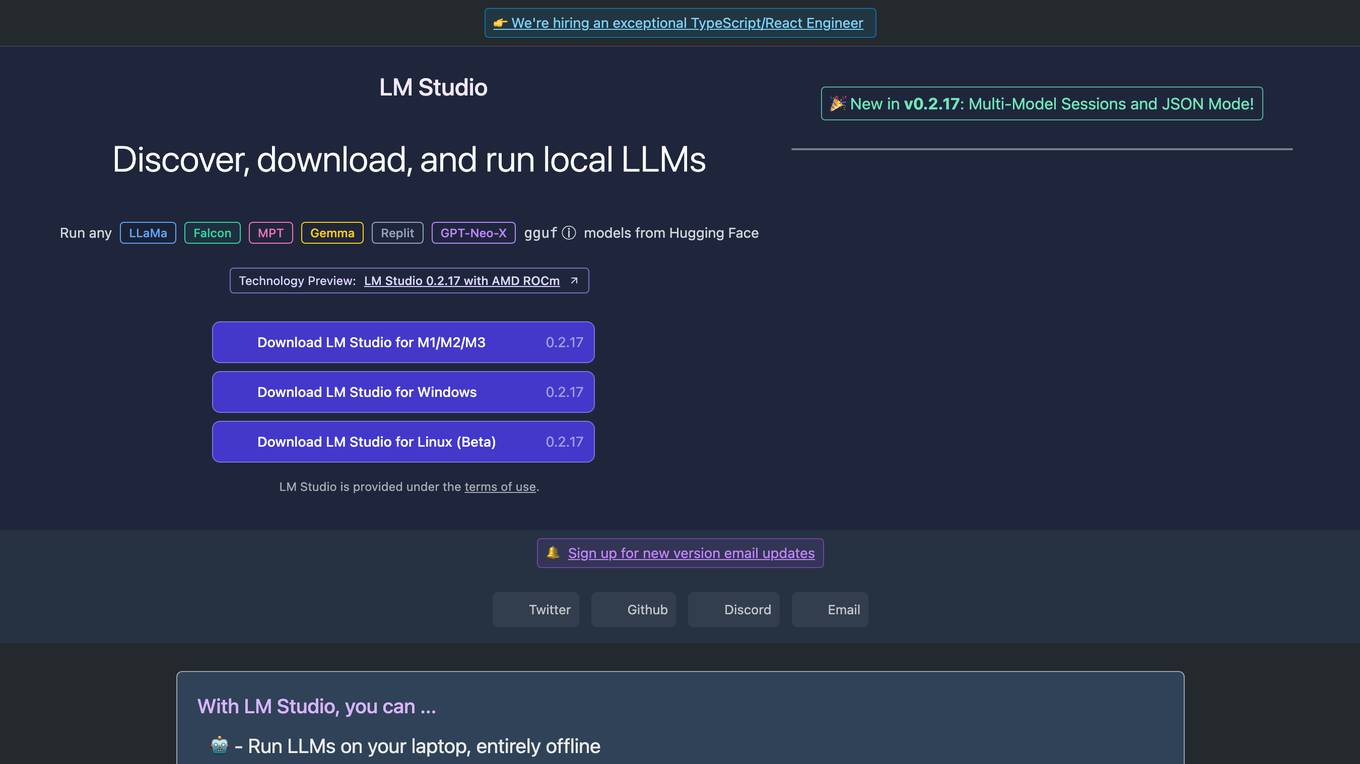
LM Studio
LM Studio is an AI tool designed for discovering, downloading, and running local LLMs (Large Language Models). Users can run LLMs on their laptops offline, use models through an in-app Chat UI or a local server, download compatible model files from HuggingFace repositories, and discover new LLMs. The tool ensures privacy by not collecting data or monitoring user actions, making it suitable for personal and business use. LM Studio supports various models like ggml Llama, MPT, and StarCoder on Hugging Face, with minimum hardware/software requirements specified for different platforms.

aify
aify is an AI-native application framework and runtime that allows users to build AI-native applications quickly and easily. With aify, users can create applications by simply writing a YAML file. The platform also offers a ready-to-use AI chatbot UI for seamless integration. Additionally, aify provides features such as Emoji express for searching emojis by semantics. The framework is open source under the MIT license, making it accessible to developers of all levels.
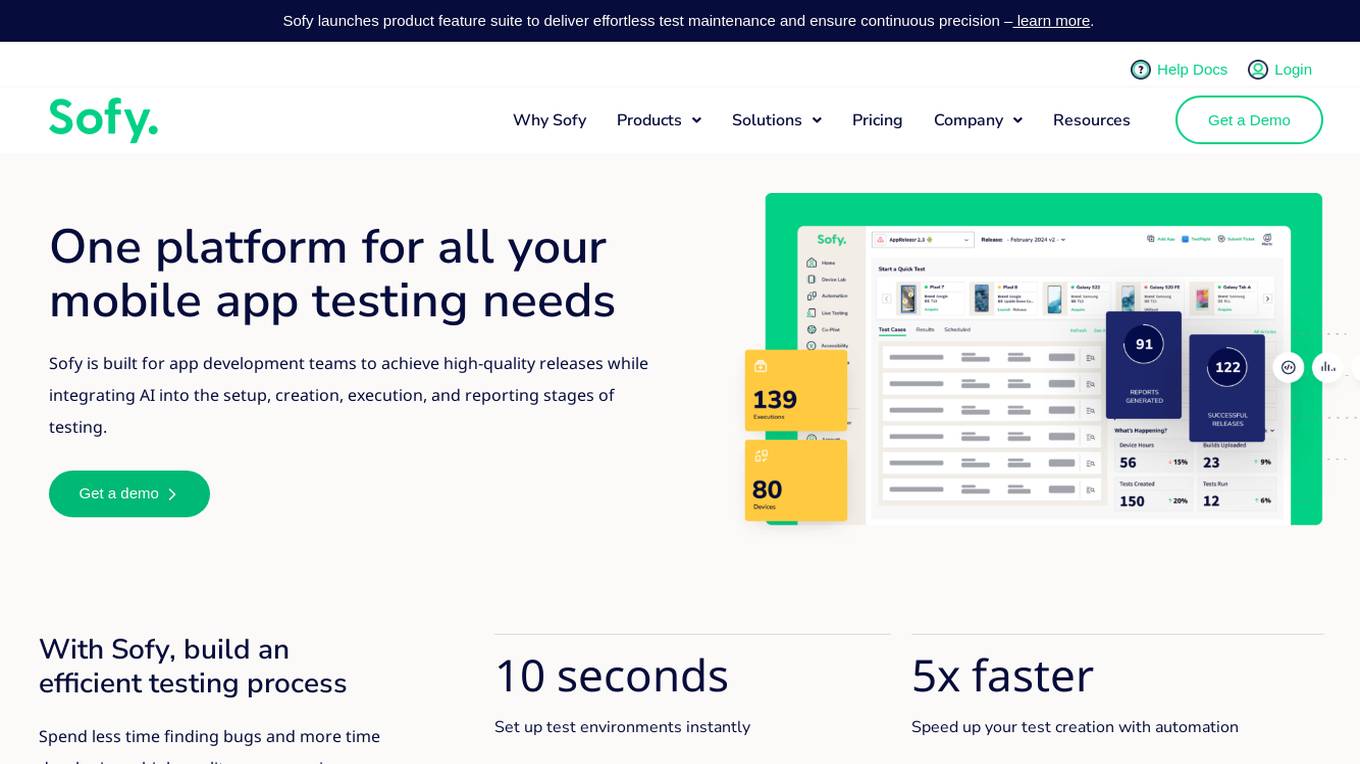
Sofy
Sofy is a revolutionary no-code testing platform for mobile applications that integrates AI to streamline the testing process. It offers features such as manual and ad-hoc testing, no-code automation, AI-powered test case generation, and real device testing. Sofy helps app development teams achieve high-quality releases by simplifying test maintenance and ensuring continuous precision. With a focus on efficiency and user experience, Sofy is trusted by top industries for its all-in-one testing solution.
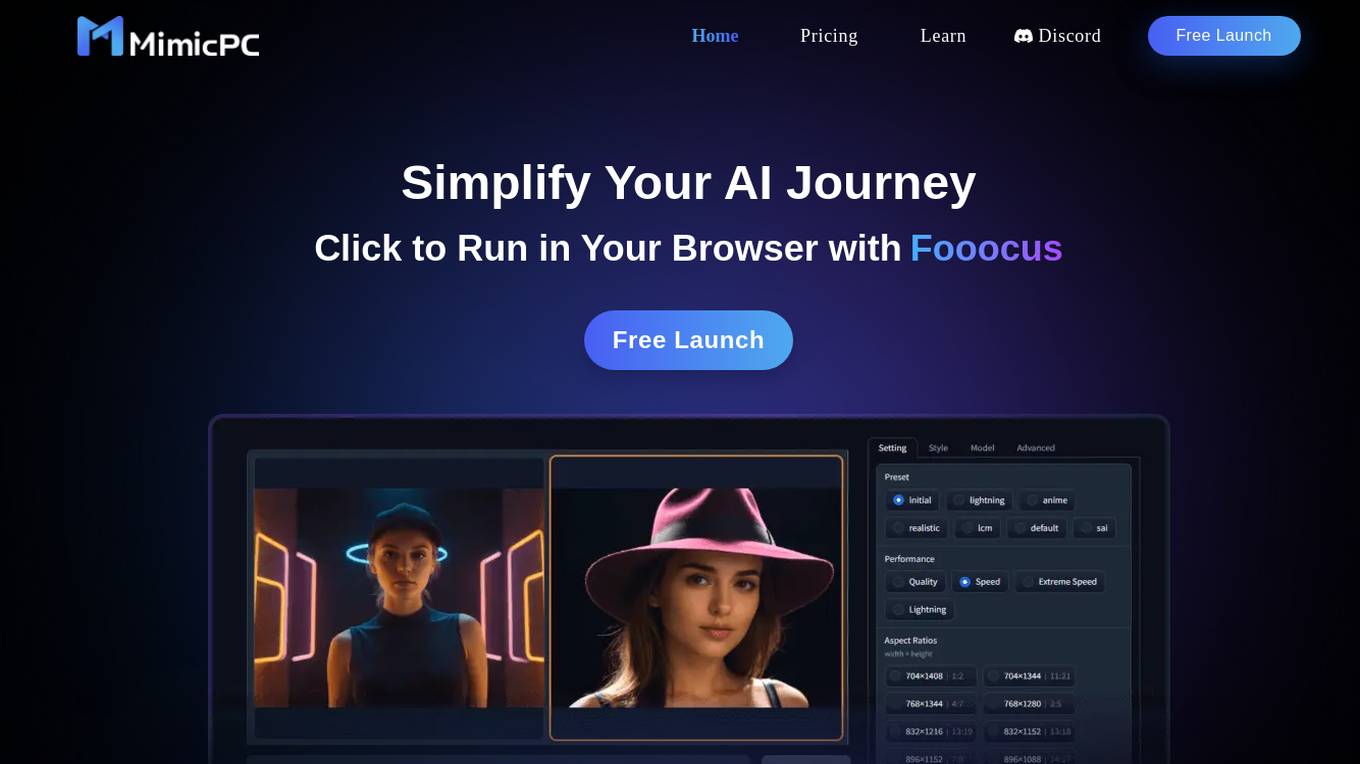
MimicPC
MimicPC is a web-based platform that allows users to run various AI applications directly in their browser without the need for installation. Users can access a wide range of AI tools and applications seamlessly, making it convenient for both professionals and enthusiasts to leverage the power of artificial intelligence. With MimicPC, users can perform tasks such as image recognition, natural language processing, and data analysis with ease.
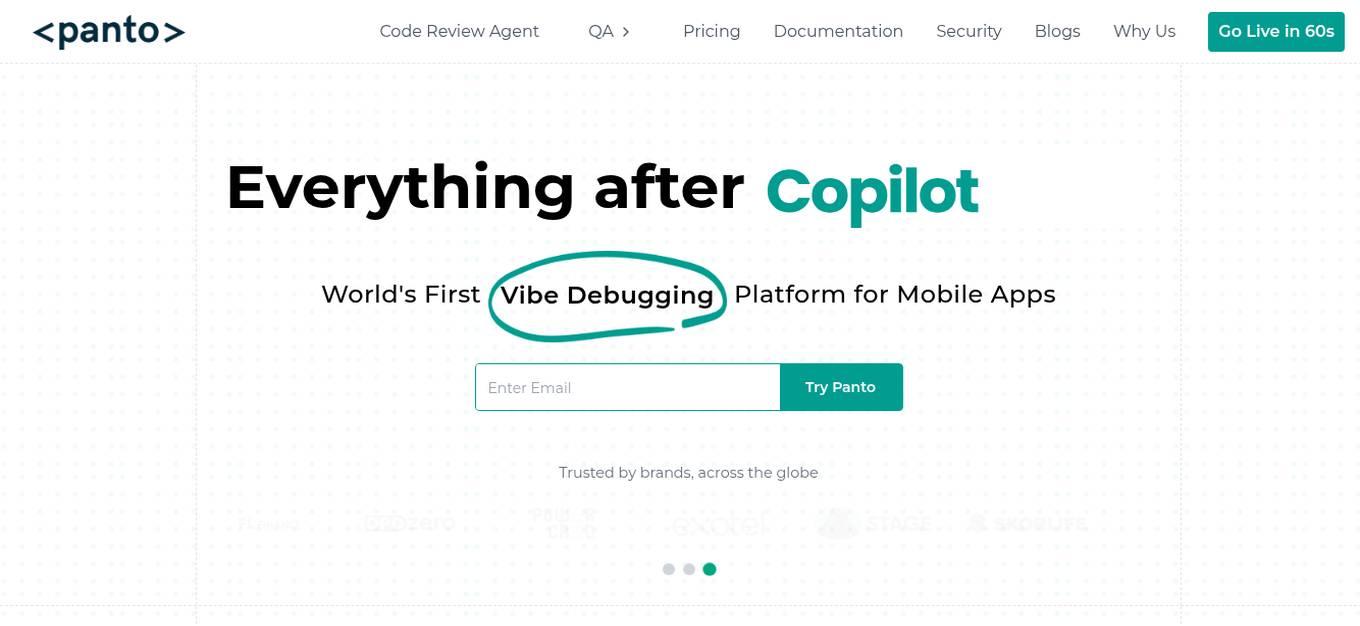
Panto AI
Panto AI is an AI automation testing platform that offers a comprehensive solution for mobile app testing, combining dynamic code reviews, code security checks, and QA automation. It allows users to create, execute, and run mobile test cases in natural language, ensuring reliable and efficient testing processes. With features like self-healing automation, real device testing, and deep failure visibility, Panto AI aims to streamline the QA process and enhance app quality. The platform is designed to be platform-agnostic and supports various integrations, making it suitable for diverse mobile app environments.
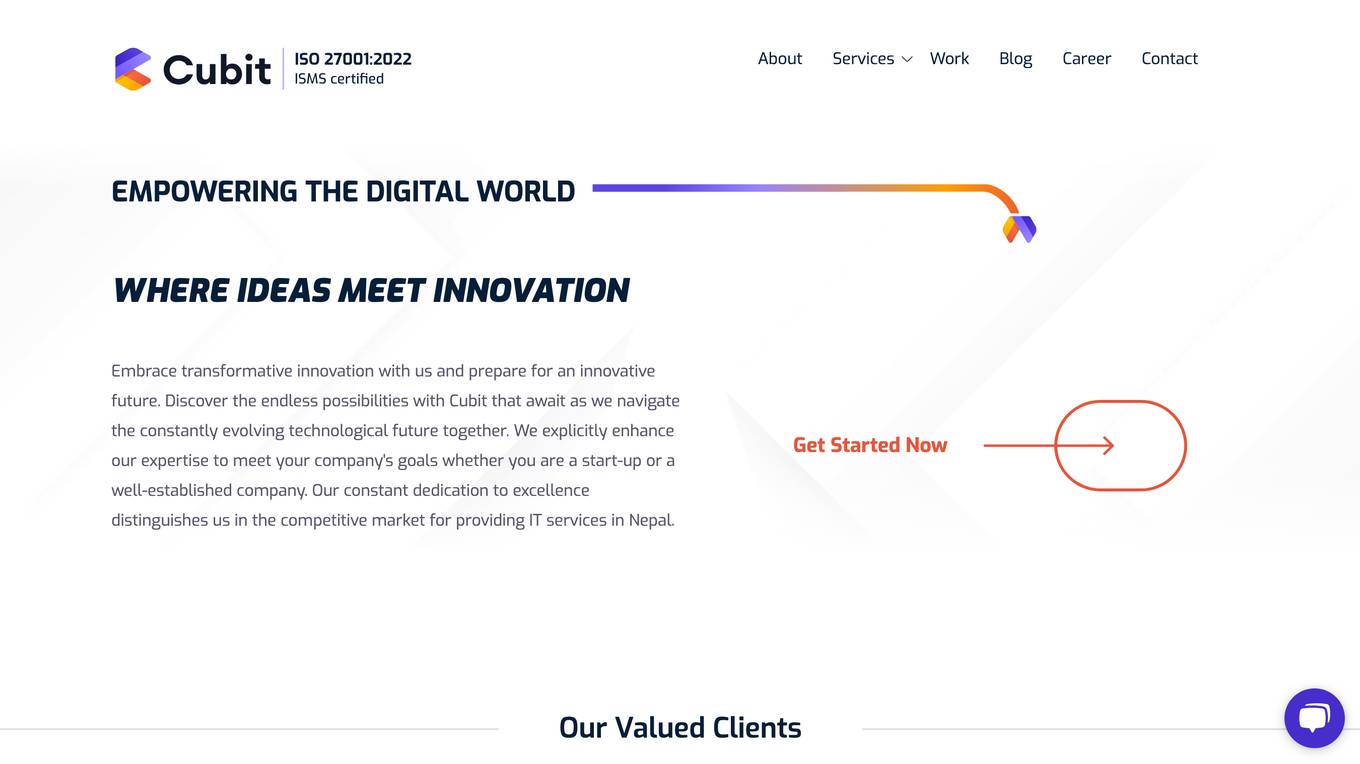
Cubit
Cubit is an IT services company in Nepal that offers a range of services including mobile app development, web development, software development, digital marketing, graphics and UI/UX, branding, chatbot, and artificial intelligence. Cubit has a team of experienced professionals who are passionate about helping businesses succeed in the digital world. Cubit's services are designed to help businesses of all sizes achieve their goals, whether it's increasing sales, improving customer engagement, or streamlining operations.
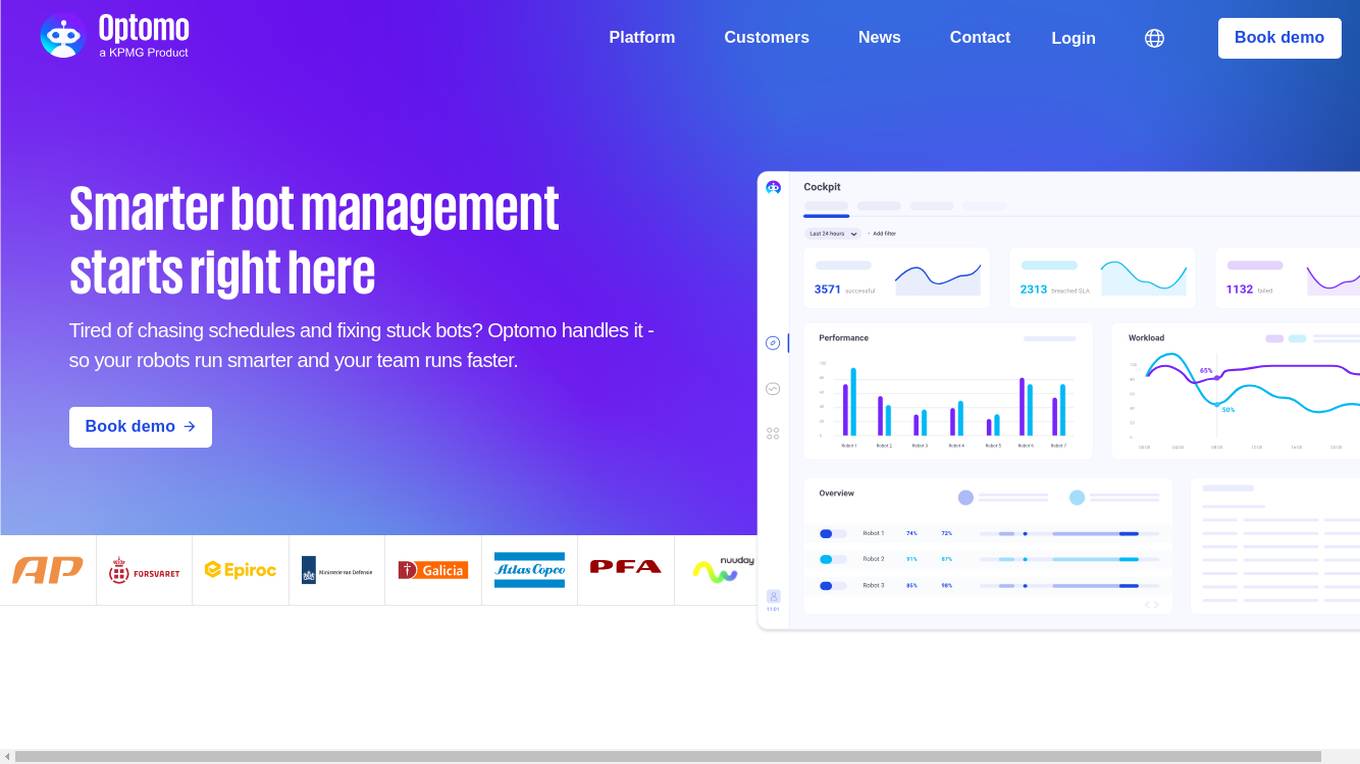
Optomo
Optomo is a platform designed to simplify robot management tasks, enabling automation teams to run their operations more efficiently. It offers features such as smart orchestration, automated oversight and maintenance, fast issue resolution, insightful dashboards, and seamless integration with existing RPA tools. Optomo has been trusted by leading organizations worldwide to improve scheduling, monitoring, and performance of their robotic processes.
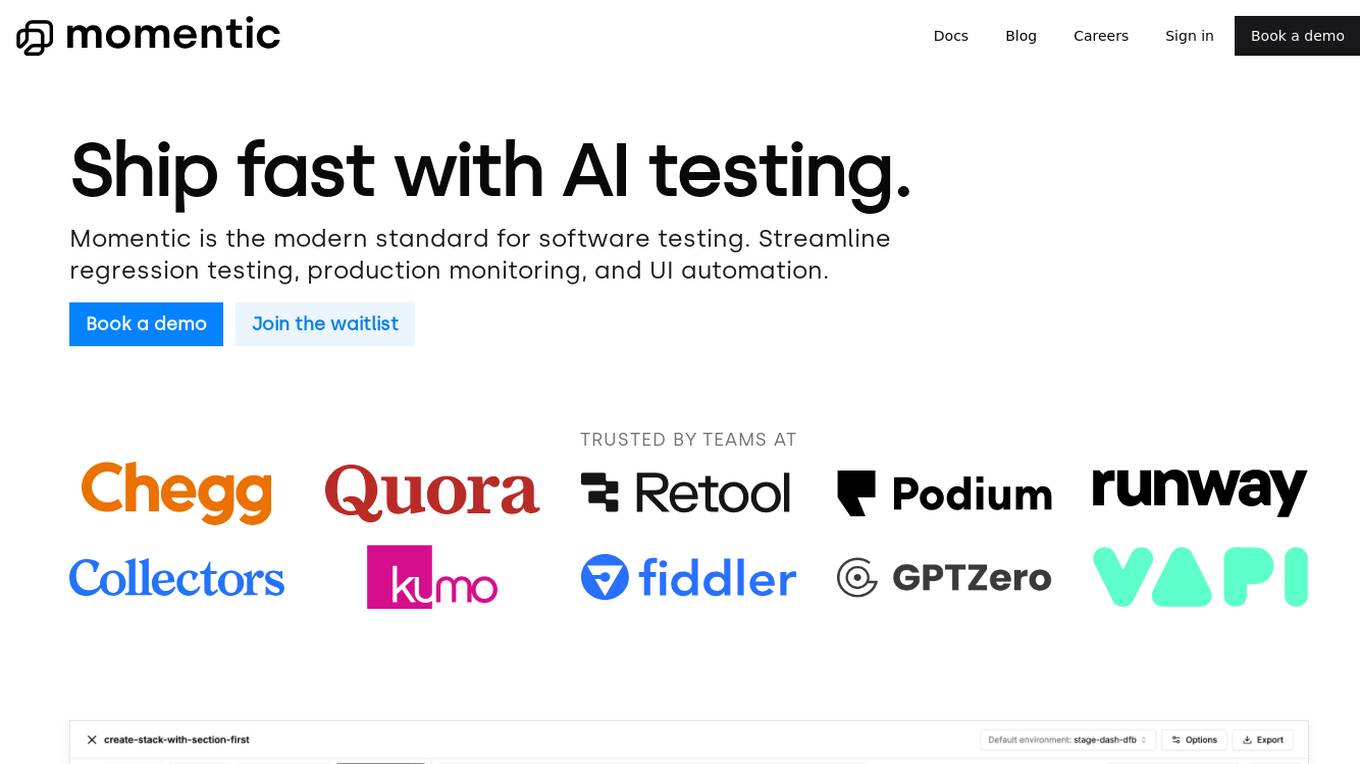
Momentic
Momentic is an AI testing tool that offers automated AI testing for software applications. It streamlines regression testing, production monitoring, and UI automation, making test automation easy with its AI capabilities. Momentic is designed to be simple to set up, easy to maintain, and accelerates team productivity by creating and deploying tests faster with its intuitive low-code editor. The tool adapts to applications, saves time with automated test maintenance, and allows testing anywhere, anytime using cloud, local, or CI/CD pipelines.
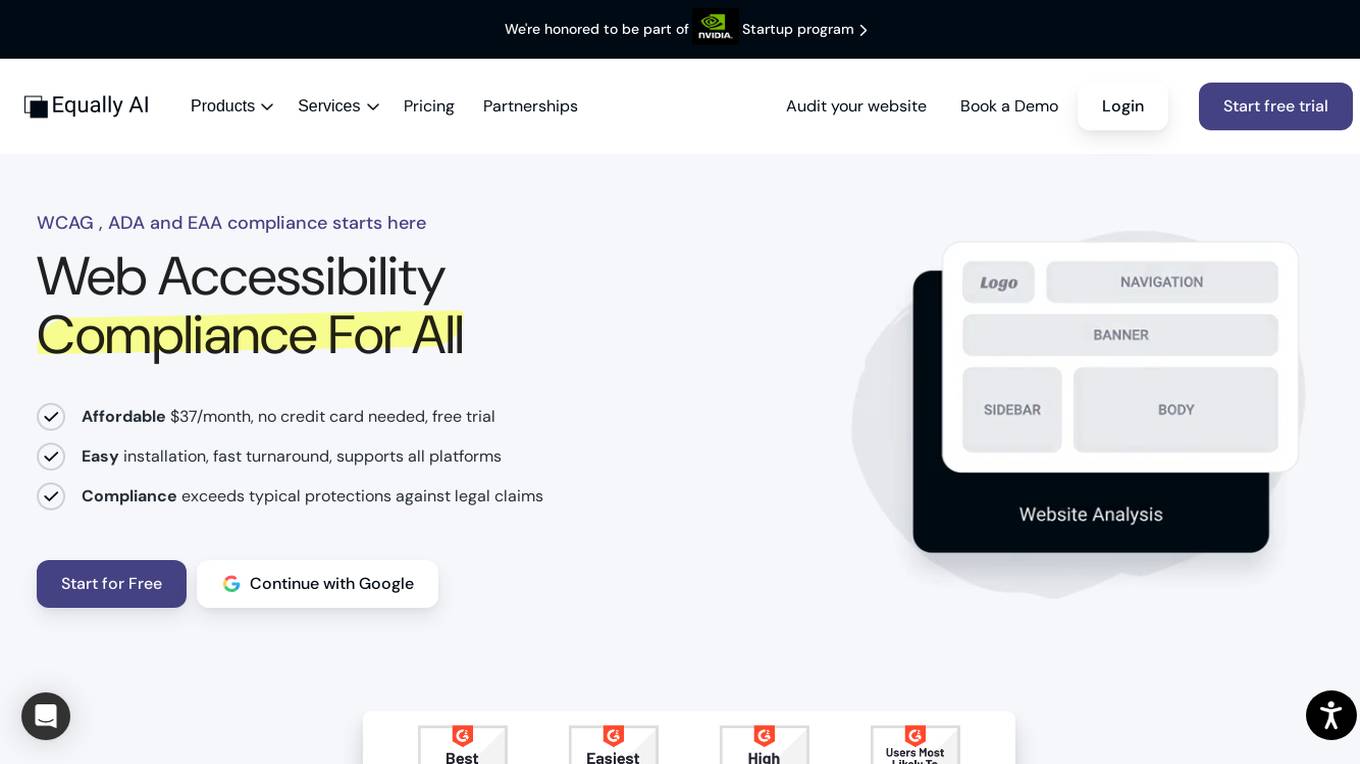
Equally.AI
Equally.AI is an AI tool designed to provide users with various functionalities that require JavaScript to run. The tool offers a range of features to enhance user experience and streamline tasks. Equally.AI aims to simplify processes and improve efficiency through its AI-powered capabilities.
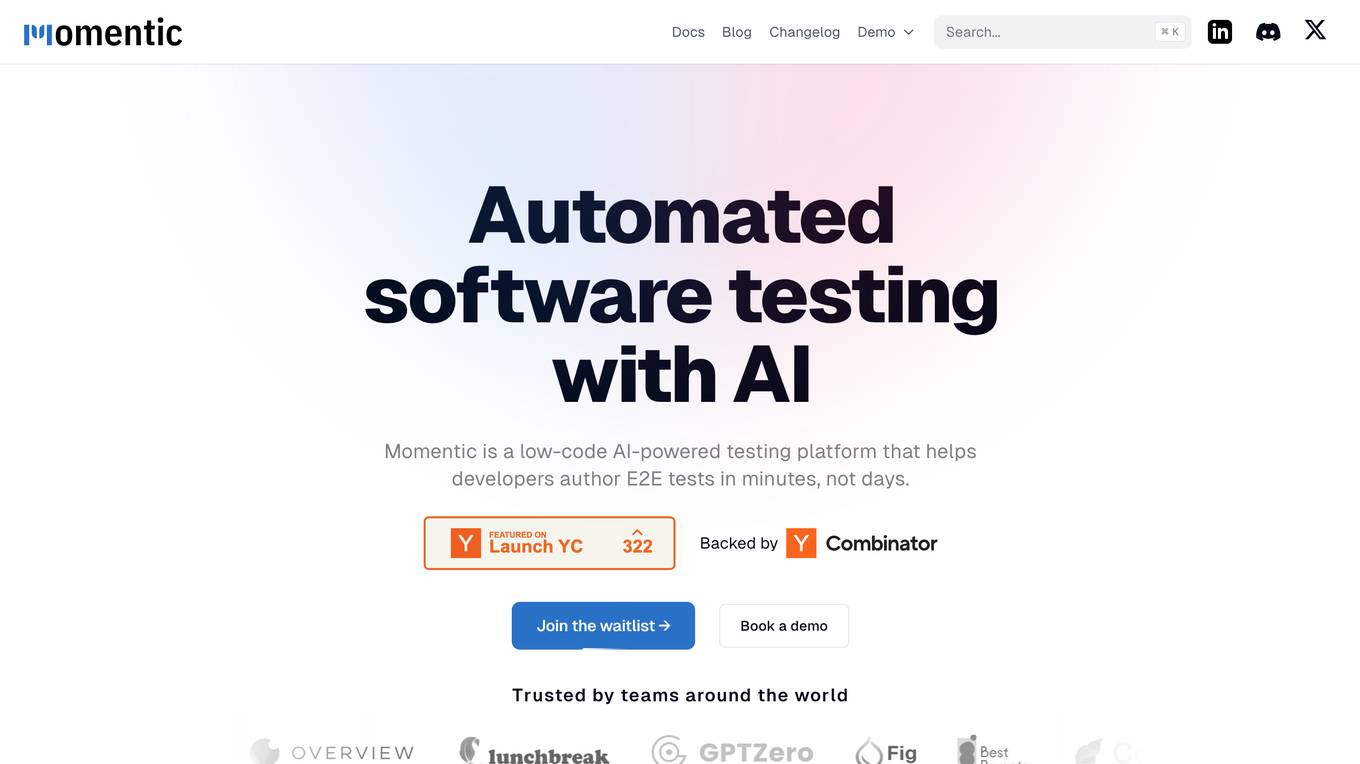
Momentic
Momentic is a purpose-built AI tool for modern software testing, offering automation for E2E, UI, API, and accessibility testing. It leverages AI to streamline testing processes, from element identification to test generation, helping users shorten development cycles and enhance productivity. With an intuitive editor and the ability to describe elements in plain English, Momentic simplifies test creation and execution. It supports local testing without the need for a public URL, smart waiting for in-flight requests, and integration with CI/CD pipelines. Momentic is trusted by numerous companies for its efficiency in writing and maintaining end-to-end tests.
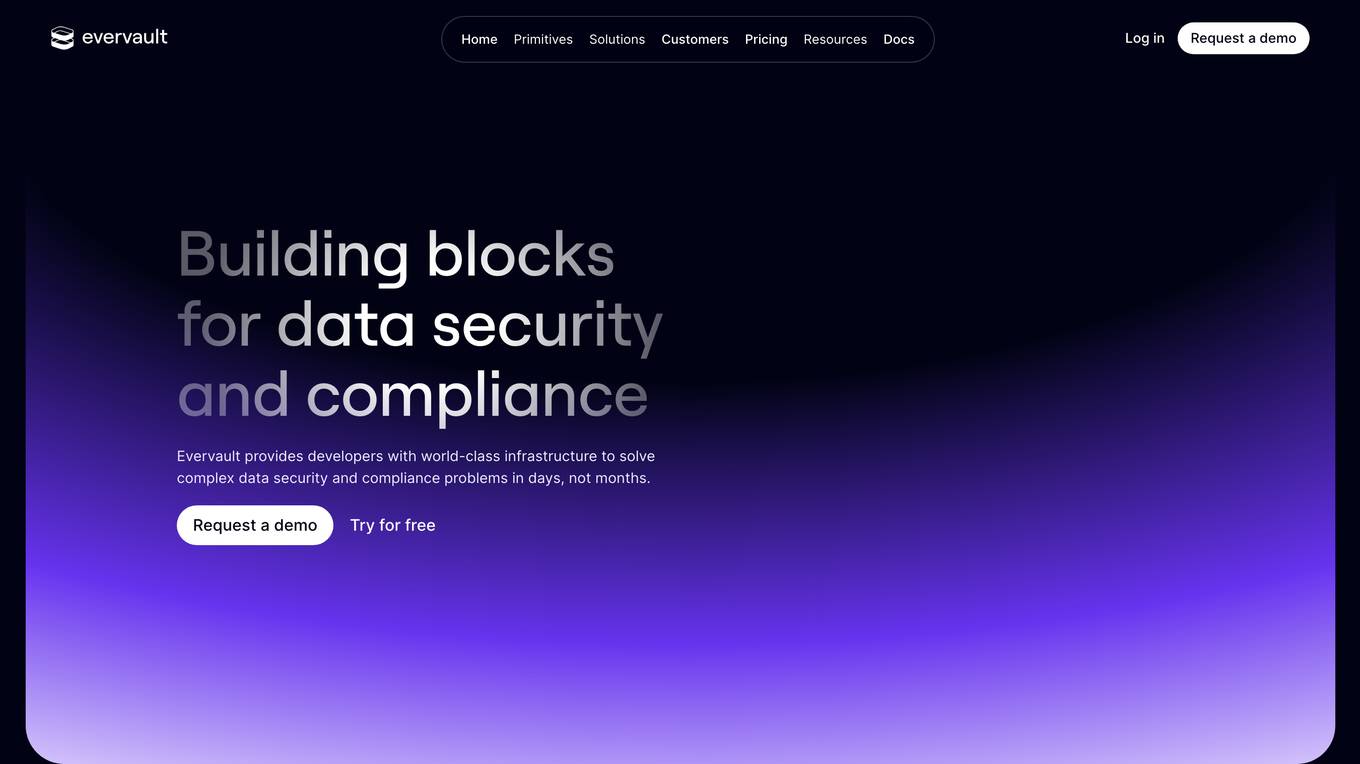
Evervault
Evervault is a platform that offers flexible payments security solutions to help businesses secure their payment data effectively. It provides maximum protection with minimal compliance burden by allowing users to tokenize cards, optimize margins, comply with PCI standards, avoid gateway lock-in, and set up card issuing programs easily. Evervault is trusted by global leaders for securing sensitive payment data and offers features like PCI compliance, payments optimization, card issuing, network tokens, key management, and BIN lookup. The platform enables users to accelerate card product launches, build complex card sharing workflows, optimize payment performance, and run highly sensitive payment operations securely. Evervault's unique encryption model ensures data security, reduced risk of data breaches, improved performance, and maximum resiliency. It offers agile payments infrastructure, customizable UI components, cross-platform support, and effortless scalability for seamless integration into existing systems.

NVIDIA Run:ai
NVIDIA Run:ai is an enterprise platform for AI workloads and GPU orchestration. It accelerates AI and machine learning operations by addressing key infrastructure challenges through dynamic resource allocation, comprehensive AI life-cycle support, and strategic resource management. The platform significantly enhances GPU efficiency and workload capacity by pooling resources across environments and utilizing advanced orchestration. NVIDIA Run:ai provides unparalleled flexibility and adaptability, supporting public clouds, private clouds, hybrid environments, or on-premises data centers.

Run Recommender
The Run Recommender is a web-based tool that helps runners find the perfect pair of running shoes. It uses a smart algorithm to suggest options based on your input, giving you a starting point in your search for the perfect pair. The Run Recommender is designed to be user-friendly and easy to use. Simply input your shoe width, age, weight, and other details, and the Run Recommender will generate a list of potential shoes that might suit your running style and body. You can also provide information about your running experience, distance, and frequency, and the Run Recommender will use this information to further refine its suggestions. Once you have a list of potential shoes, you can click on each shoe to learn more about it, including its features, benefits, and price. You can also search for the shoe on Amazon to find the best deals.

Practice Run AI
Practice Run AI is an online platform that offers AI-powered tools for various tasks. Users can utilize the application to practice and run AI algorithms without the need for complex setups or installations. The platform provides a user-friendly interface that allows individuals to experiment with AI models and enhance their understanding of artificial intelligence concepts. Practice Run AI aims to democratize AI education and make it accessible to a wider audience by simplifying the learning process and providing hands-on experience.

Reflect
Reflect is an AI-powered test automation tool that revolutionizes the way end-to-end tests are created, executed, and maintained. By leveraging Generative AI, Reflect eliminates the need for manual coding and provides a seamless testing experience. The tool offers features such as no-code test automation, visual testing, API testing, cross-browser testing, and more. Reflect aims to help companies increase software quality by accelerating testing processes and ensuring test adaptability over time.
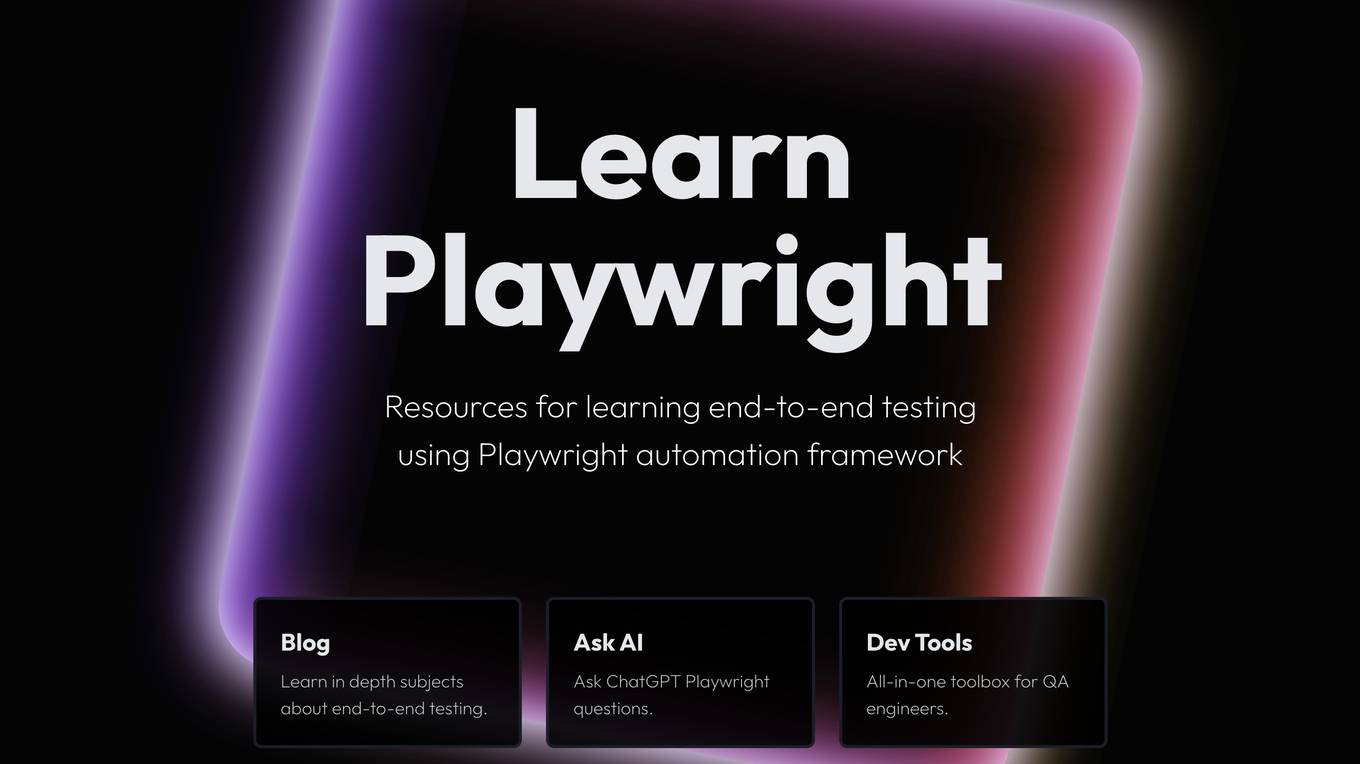
Learn Playwright
Learn Playwright is a comprehensive platform offering resources for learning end-to-end testing using the Playwright automation framework. It provides a blog with in-depth subjects about end-to-end testing, an 'Ask AI' feature for querying ChatGPT about Playwright questions, and a Dev Tools section that serves as an all-in-one toolbox for QA engineers. The platform also curates QA and Automation job opportunities, answers common questions about Playwright, hosts a Discord forum archive, offers various videos including tutorials and conference talks, provides a browser extension with a GUI for generating Playwright locators, and features a QA Wiki with definitions of common end-to-end testing terms. Users can quickly access all tools by using the shortcut Ctrl + k + 'Tools'.
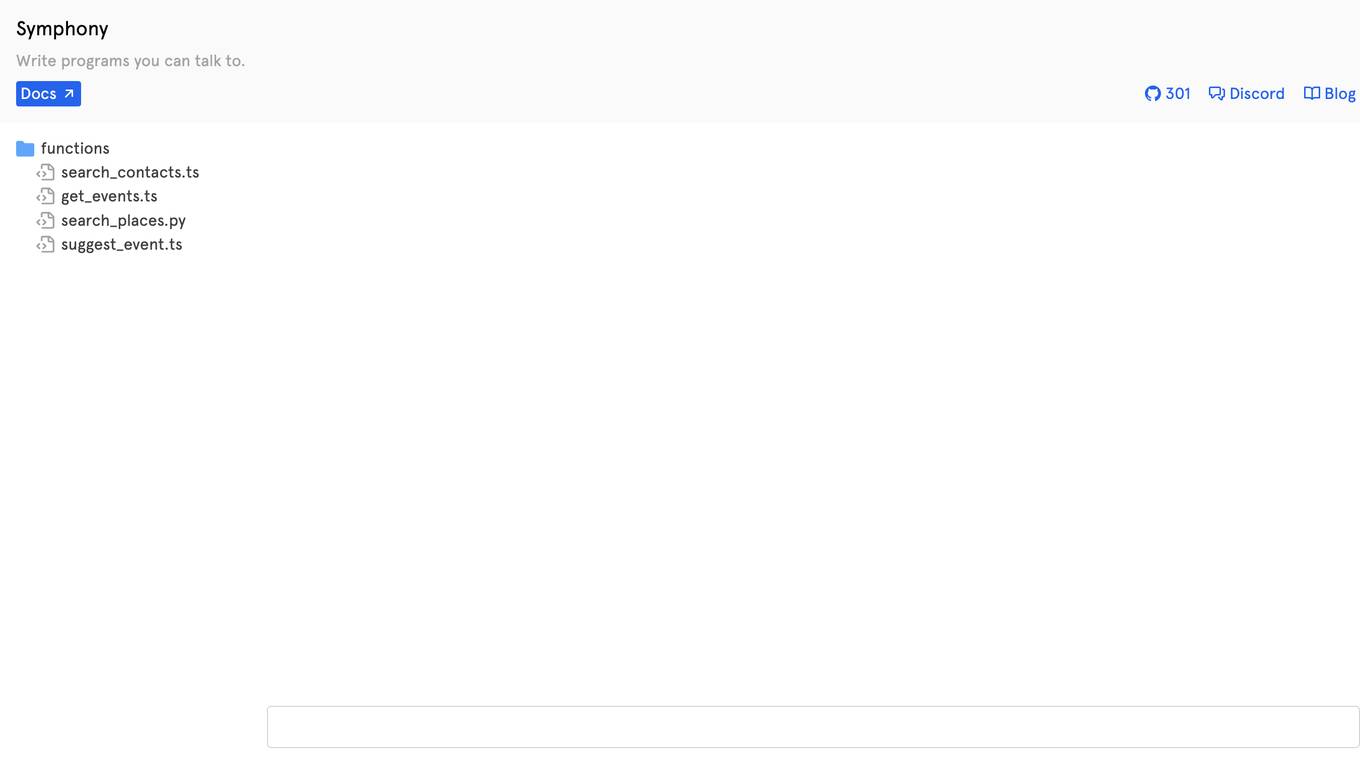
Symphony
Symphony is a programming platform that allows users to write programs using natural language. It aims to simplify the process of coding by enabling users to interact with the system through conversational language, making it more accessible to individuals without a technical background. Symphony provides a user-friendly interface for creating scripts and automating tasks, bridging the gap between traditional programming languages and everyday communication.
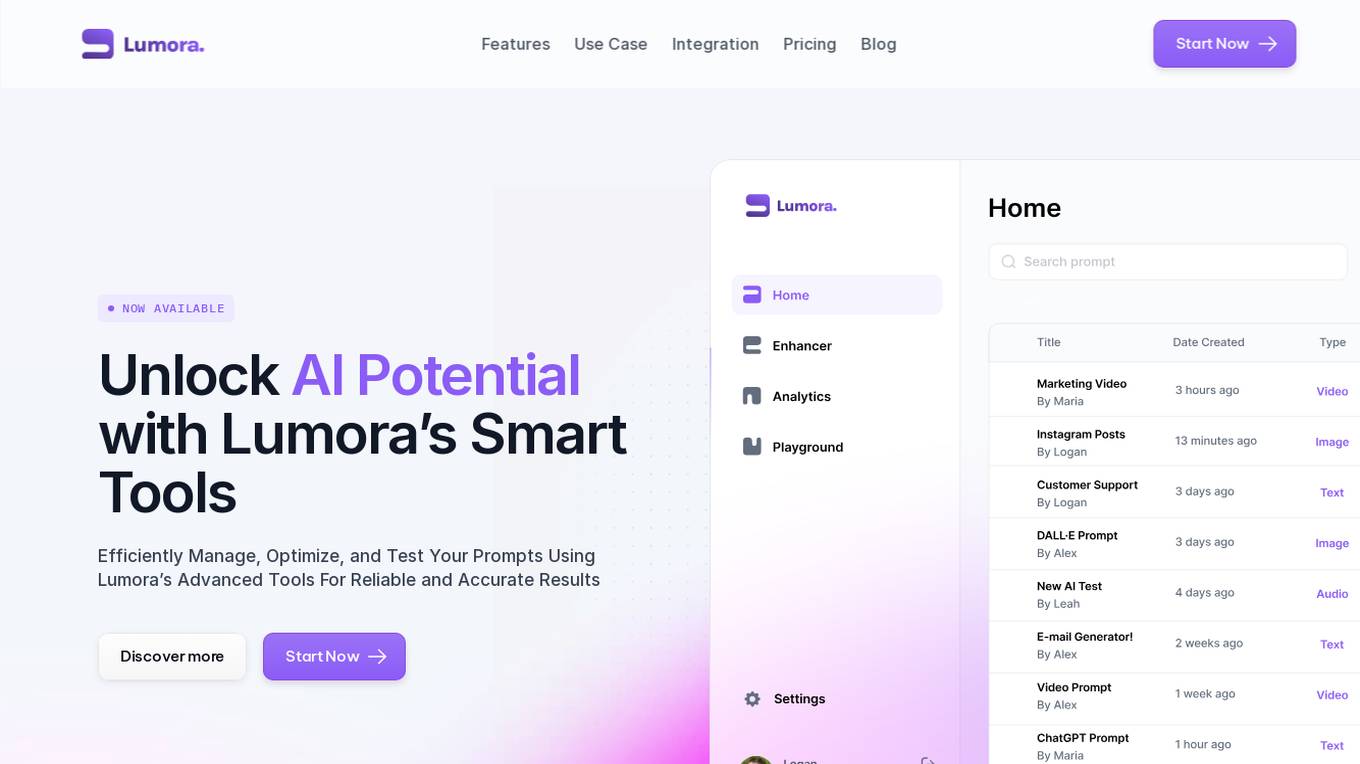
Lumora
Lumora is an AI tool designed to help users efficiently manage, optimize, and test prompts for various AI platforms. It offers features such as prompt organization, enhancement, testing, and development. Lumora aims to improve prompt outcomes and streamline prompt management for teams, providing a user-friendly interface and a playground for experimentation. The tool also integrates with various AI models for text, image, and video generation, allowing users to optimize prompts for better results.
1 - Open Source AI Tools
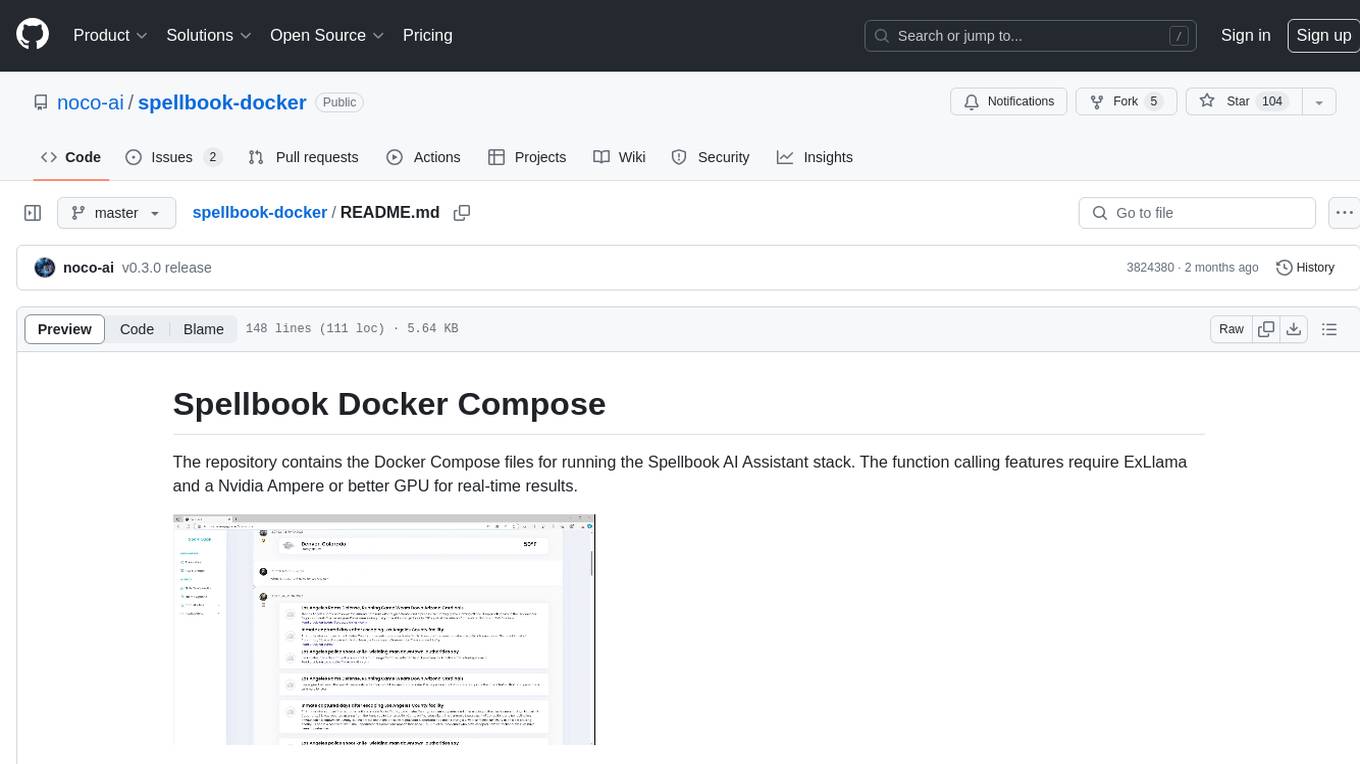
spellbook-docker
The Spellbook Docker Compose repository contains the Docker Compose files for running the Spellbook AI Assistant stack. It requires ExLlama and a Nvidia Ampere or better GPU for real-time results. The repository provides instructions for installing Docker, building and starting containers with or without GPU, additional workers, Nvidia driver installation, port forwarding, and fresh installation steps. Users can follow the detailed guidelines to set up the Spellbook framework on Ubuntu 22, enabling them to run the UI, middleware, and additional workers for resource access.
20 - OpenAI Gpts

Consulting & Investment Banking Interview Prep GPT
Run mock interviews, review content and get tips to ace strategy consulting and investment banking interviews

Dungeon Master's Assistant
Your new DM's screen: helping Dungeon Masters to craft & run amazing D&D adventures.

Database Builder
Hosts a real SQLite database and helps you create tables, make schema changes, and run SQL queries, ideal for all levels of database administration.

Restaurant Startup Guide
Meet the Restaurant Startup Guide GPT: your friendly guide in the restaurant biz. It offers casual, approachable advice to help you start and run your own restaurant with ease.

Community Design™
A community-building GPT based on the wildly popular Community Design™ framework from Mighty Networks. Start creating communities that run themselves.

Code Helper for Web Application Development
Friendly web assistant for efficient code. Ask the wizard to create an application and you will get the HTML, CSS and Javascript code ready to run your web application.

Creative Director GPT
I'm your brainstorm muse in marketing and advertising; the creativity machine you need to sharpen the skills, land the job, generate the ideas, win the pitches, build the brands, ace the awards, or even run your own agency. Psst... don't let your clients find out about me! 😉

Pace Assistant
Provides running splits for Strava Routes, accounting for distance and elevation changes
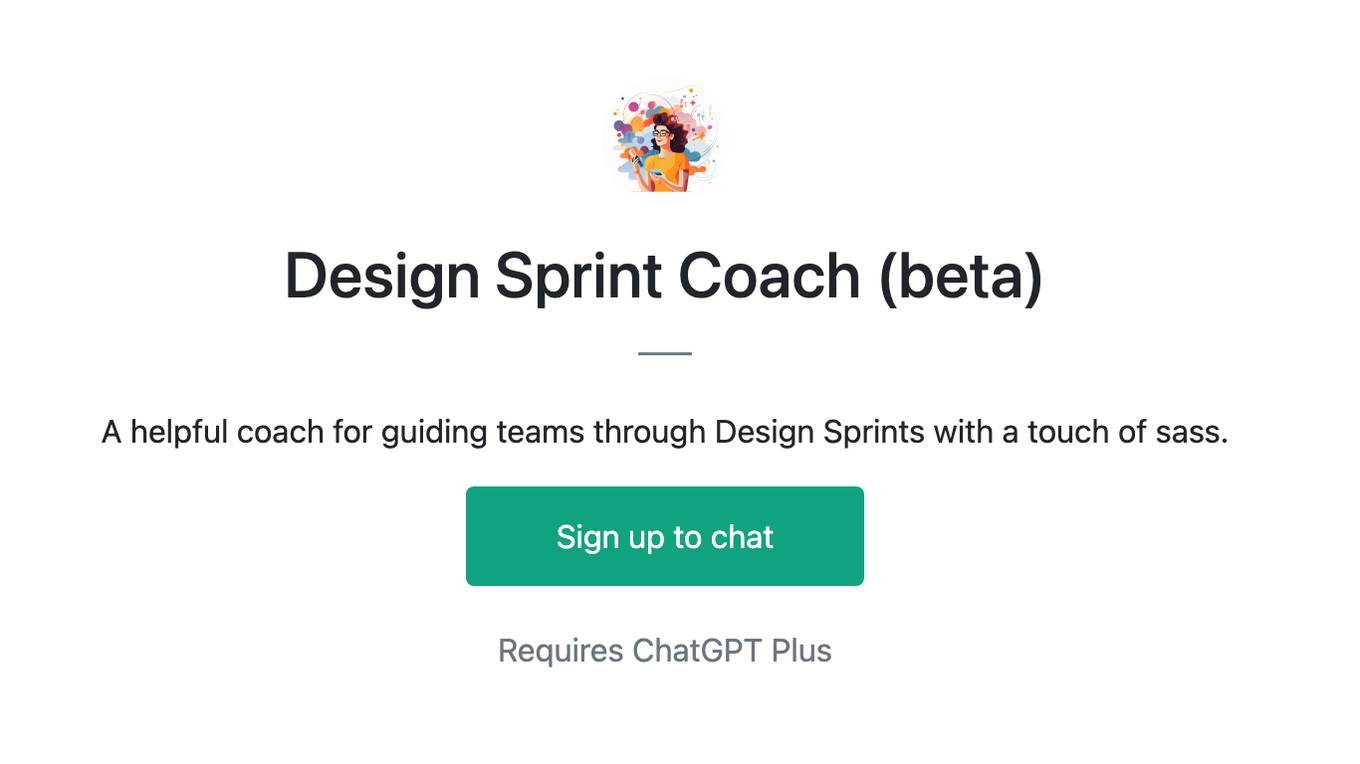
Design Sprint Coach (beta)
A helpful coach for guiding teams through Design Sprints with a touch of sass.








